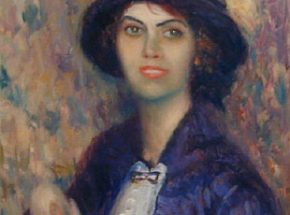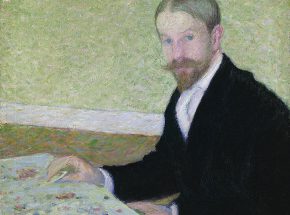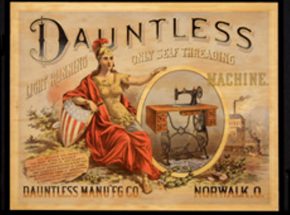

Robert Henri was born Robert Henry Cozad in Cincinnati, in 1865, the son of a professional gambler and businessman. In 1881 he accompanied his family to Denver. When his father was indicted for manslaughter a year later, the Cozads changed their name and fled to Atlantic City, New Jersey. In 1886 Henri enrolled at the Pennsylvania Academy of the Fine Arts, where he studied under Thomas Anshutz, Thomas Hovenden, and James B. Kelly. In 1888 he went to Paris and enrolled at the Académie Julian under Adolphe-William Bouguereau and Tony Robert-Fleury. During the summers he painted in Brittany and Barbizon, and visited Italy prior to being admitted to the Ecole des Beaux-Arts in 1891. He returned to Philadelphia late that year, and in 1892 resumed studying at the academy. He also began his long and influential career as an art teacher at the School of Design for Women, where he taught until 1895. During this period he met the young newspaper illustrators who would later achieve fame as members of The Eight: John Sloan, William Glackens, George Luks, and Everett Shinn. He made regular trips to Paris where he was particularly influenced by Edouard Manet, Frans Hals, and Diego Velázquez. In 1899, one year after his marriage to Linda Craige, one of his paintings was purchased for the Musée National du Luxembourg.
In 1900 Henri settled in New York and taught at the New York School of Art from 1902 to 1908. He gradually began to reject the genteel traditions of academic painting and Impressionism, and turned his attention to urban realist subjects executed in a bold, painterly style. In 1906 he was elected to the National Academy of Design, and that summer he taught in Spain. When the academy refused to exhibit works by Henri’s circle in its 1907 annual show, he resolved to organize an independent exhibition. The result was the famous show of The Eight held at the Macbeth Gallery in February 1908. That year he married his second wife, the illustrator Marjorie Organ. In 1910 he organized the first “Exhibition of Independent Artists,” between 1911 and 1919 he arranged jury-free exhibitions at the MacDowell Club, and in 1913 he helped the Association of American Painters and Sculptors organize the Armory Show. Henri’s influence began to wane after the ascent of European modernism, although he continued to win numerous awards. He taught at the Art Students League from 1915 until 1927.
Although Henri was an important portraitist and figure painter, he is best remembered as a progressive and influential teacher. His ideas on art were collected by former pupil Margery Ryerson and published as The Art Spirit (Philadelphia, 1923). He died in 1929 at the age of sixty-four.
www.nga.gov


